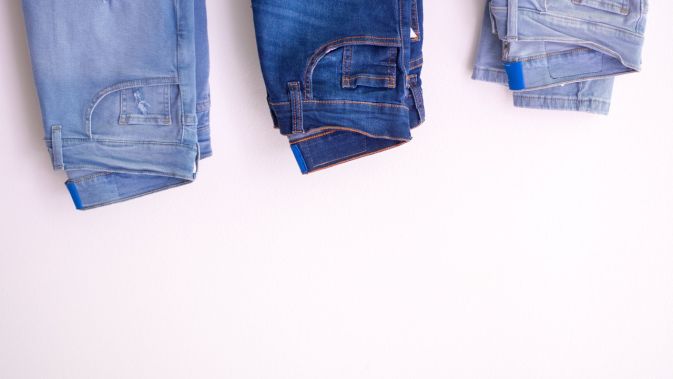
When and Why Should You Wash Your Jeans?
Let's begin with the "never wash your jeans" rule. If you don't want to wash your jeans, that's entirely up to you. That pair of denim belongs to you! It's understandable if that advice doesn't make sense to you, because it does. That being said, denim fades because of the buildup of dirt, skin, your natural body oils, and environmental dirt, which the never-washers don't realize is also a factor in the denim's breakdown. As a result! As long as you don't mind wearing dirty pants, washing your jeans isn't going to cause any major harm. As a matter of fact, you'll increase their lifespan in numerous ways.
If you've been wearing them a lot, you'll want to wash them sooner rather than later. A wash is in order if they stink, are visibly filthy, or have become stretched out or sagging at the knees. Wash your jeans every 5–10 wears, even if they don't appear dirty, because most laundry soil is invisible (skin, oil, sweat, and so on) and should be washed even if they don't appear dirty to you every now and then.
Washing Jeans the Right Way
Washing your jeans isn't necessarily bad for them, but there are a few things to keep in mind. This will ensure that you preserve the color of your jeans, as well as allow more water and detergent into and around where they're dirtiest—the insides of your jeans. The use of a detergent specifically formulated for dark clothing can also help to preserve and prevent the fading of darker jeans.
Jeans can also be hand washed, which reduces wear and tear because it's a more gentle experience for the fibers. It's probably best to wash jeans in a bathtub or a utility sink because they're so heavy. Cold water and a small amount of detergent are all that's needed. Soak the jeans for 15-30 minutes, then thoroughly rinse them. To get the best results, I use a three-step rinse process that involves dumping out the dirty water, refilling the tub with fresh water, and finishing with a final rinse under the faucet. (I know it sounds like a lot of work, but it's not.) Do not wring or twist the fibers of the jeans after they have been rinsed, as this will cause them to break down. Air dry by laying
Flat or hanging the items.
Overuse of laundry detergent, liquid fabric softener, or both may be to blame for the lingering scent in the laundry room. It's easy to fall into the trap of believing that more detergent equals a cleaner house or softer jeans equals a softer pair of jeans. Overuse of laundry products, on the other hand, will only make the jeans dirtier because of product buildup. There is a smell associated with all of this product buildup when it comes into contact with the skin, oil, and sweat. It smells like it could even be compared to milk.
Run the jeans (or whatever) through the washer with half a cup of white vinegar and no detergent if you suspect you've been using too much detergent or fabric softener. The vinegar acts as a natural fabric softener and eliminates lingering odors, while the wash cycle without detergent removes any sudsy buildup. Keep an eye on how much detergent and fabric softener you use, and don't be tempted to use too much in the future.
The Real Enemy Is Electric Dryers
When it comes to drying your jeans, you may want to rethink your decision to do so. You can dry your baggy jeans if you want to. High heat drying isn't going to be a great experience for more expensive pairs of jeans, especially dark denim.
Use the medium heat setting to reduce the shrinkage of your regular jeans to counteract the stretching that occurs with normal wear. Avoid shrinkage and fading by using low heat settings or drying your garments in the open air.
It's common for people to dry clean their more expensive jeans because air drying isn't an option for everyone.
Freezing Jeans: A Word of Advice
When it comes to chilling your favorite pair of jeans, there's nothing wrong with doing so. Don't waste your freezer space trying to get your jeans clean by freezing them; this method does not work to remove bacteria from denim. A deep freeze will remove odors, but as soon as you put the jeans on, your body heat will reactivate any bacteria or other microbes that were lurking in the material.
Clean Your Jeans After Each Use
It's possible that a detergent-free triage wash and better laundering practices in the future will help solve this mystery. As a result, here are some pointers for when it's time between washes to give your jeans a little TLC.
Buying a commercial fabric refresher is obviously an option. You can make your own version by diluting 1 tablespoon of baking soda with 2 cups of water and 5–10 drops of essential oil (pick your favorite scent!). You can also use a spray bottle to decant white vinegar or vodka and use that as a deodorizer; simply mist anything that's starting to smell a little funky.
Also, it's a good idea to hang your re-worn jeans on a sturdy pants hanger near a window or fan so that they can air out between wears, which will help them last longer.
Was this helpful?
Kingerlon collects & utilizes cookies from third-parties & affiliate networks to improve user experience. If you buy a product or service after clicking on one of our links, we may get a commission.










